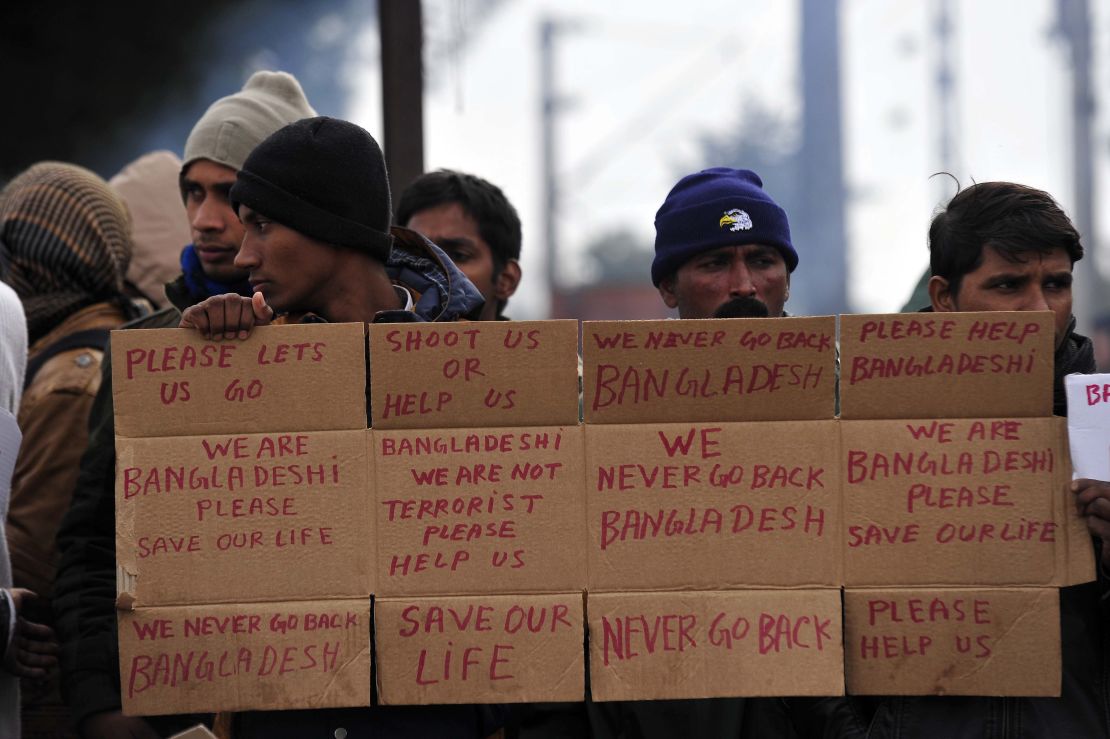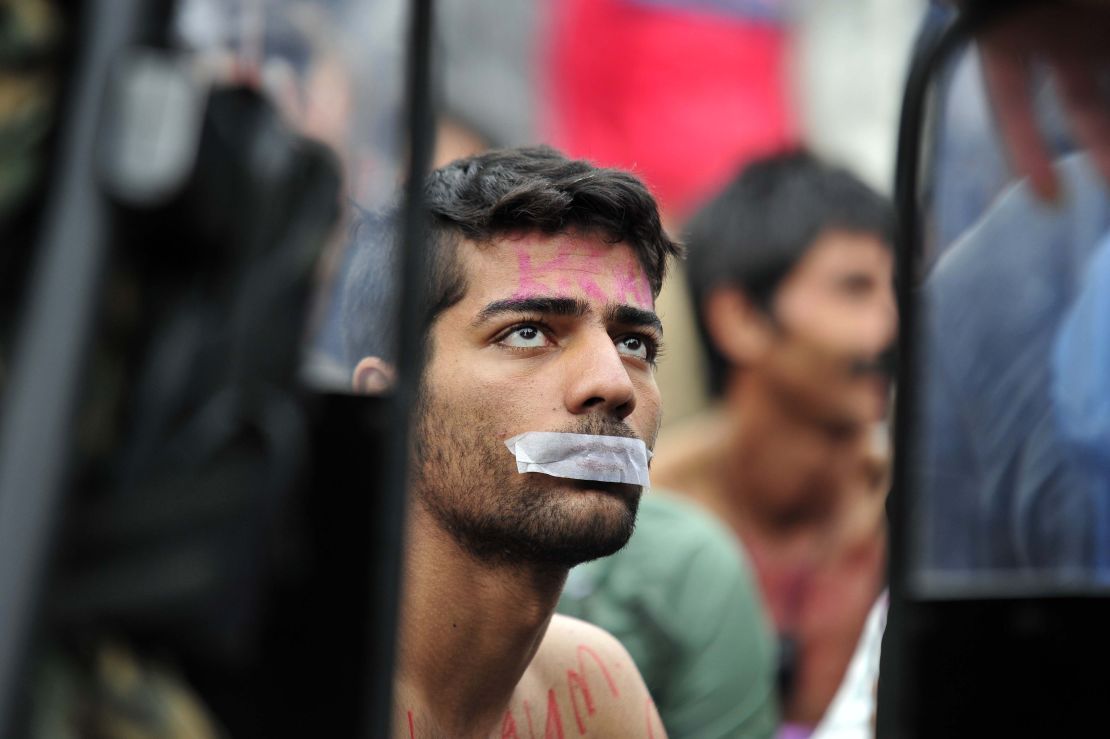Story highlights
'Iranians' sew their lips together to protest at being stuck on Greek-Macedonian border
"We simply cannot do it anymore': Sweden clamps down on its famous "open door" policy
Greatest migration of people in Europe since WWII continues unabated
“Shoot us or help us.”
Hundreds of migrants stuck in no man’s land at the Greek-Macedonian border stand next to these heartbreaking words scrawled on a piece of cardboard.
On Turkey’s border with Syria, a man fleeing unbearable violence in his homeland is allegedly beaten by a guard and forced back into a war zone.
In Sweden, the deputy prime minister struggles to contain her tears: Her country can no longer cope with the influx of people and is closing its doors to all but a few.
These are three snapshots of life for refugees and migrants trying to find a new home in a continent consumed by terror and overwhelmed by the human cost of Syria’s war.
The attacks in Paris earlier this month may have overshadowed the so-called refugee crisis – but the greatest migration of people on the European continent since World War II continues unabated.

‘Iranians’ sew lips shut
In one of the most extreme protests seen since the start of the refugee crisis, about 10 men trapped on the Greek-Macedonian border have sewn their lips shut to silently oppose being blocked from continuing further into Europe.
Syrian refugees: What happened to them?
The men, who told news agency Agence France-Presse they were from Iran, passed a needle with black thread through their lips, tightly pulling the top and bottom together.
They then stripped to the waist – some writing ‘Iran’ on their foreheads, another scrawling ‘Just Freedom’ on his chest – and sat down in front of riot police.
The men have kept their lips sewn closed for a few days, effectively going on hunger strike, Stella Nanou, a U.N. refugee agency spokesperson who was on the scene Wednesday, told CNN.
They are among some 1,300 migrants, Nanou said, who are stuck in no man’s land between the two countries after Macedonia and several other western Balkan countries – including Slovenia, Croatia and Serbia – last week started limiting passage only to those fleeing conflict.
Refugees from Syria, Iraq and Afghanistan are being allowed through but those from other countries are deemed “economic migrants” and turned back.
Entry has been blocked for people from as far afield as Pakistan, Morocco and Liberia.
“These are very tired people, they have had long journeys, they are in very harsh conditions,” said Nanou. “(They are) are frustrated – they cannot understand how it is possible that a week ago other people from the same country could cross and now they cannot.”

Frustrations boiled over Thursday when hundreds of desperate migrants tried to storm the border, tearing down part of the barbed wire crossing, Reuters reported. Some threw stones at police in riot gear and others fell to their knees shouting “We want to go to Germany,” the report said.
Meanwhile, in the rest of Greece, as the weather gets worse, the flow of migrants has seen a “drastic decrease.”
Just 155 migrants arrived on Greek islands by sea last Sunday, according to the International Organization for Migration, compared with an average of 4,500 crossings per day since the beginning of November.
U-turn: Sweden’s deputy PM cries
Deputy Prime Minister Asa Romson’s voice cracked, and could hardly hold back the tears as she announced Tuesday that her country’s “open door” policy on refugees is ending.
Sweden has always prided itself on the number of refugees it takes – the most per capita in the Western world – and sees itself as a small country making an enormous contribution.
But it appears that now even Sweden’s famous support for asylum is breaking down under the sheer number of refugees knocking on its door.
In the past two months alone, 80,000 people have sought refuge in Sweden, according to its government. Official estimates suggest that up to 190,000 refugees could come to the country of 10 million this year.
Romson’s emotional moment came as she described the “tough discussions” the Swedish government had been having on how to help the country cope.
Prime Minister Stefan Lofven said: “It pains me that Sweden is no longer capable of receiving asylum seekers at the high level we do today.
“We simply cannot do any more.”
Sweden will temporarily adjust the asylum regulations to the minimum level in the EU to encourage refugees to seek a new home elsewhere, the government said.
Elderly, sick ‘run gauntlet’ at Turkey’s border
Turkey has “all but closed its borders” to Syrians fleeing airstrikes and other violence, rights group Human Rights Watch reported this week.
Turkish border guards have been intercepting Syrians near the border, beating and pushing them back into Syria or detaining them and later expelling them, witnesses told the group.
All of the 51 Syrians the group interviewed in Turkey said that it was common knowledge that Syrians could only enter Turkey using smugglers.
Four people claimed that Turkish border guards beat them, including the testimony of one man from Dar’aa who crossed on October 17:
“One of the guards hit me on the back of my head and in my ribs with the butt of his rifle and I fell over and started to bleed.
“Then another guard kicked me in the head and broke my glasses. It hurt so much I vomited.
“I don’t know why they attacked me. Maybe they thought I was a smuggler?”
Gerry Simpson, a senior refugee researcher, said: “Turkey’s border closure is forcing pregnant women, children, the elderly, the sick and the injured to run the (gauntlet) of Turkish border officials to escape the horrors of Syria’s war.”
Turkey says the group’s claims of not letting in refugees and pushing them back are “not true,” a government official told CNN Friday.
“Turkey continues its open door policy … wherever there is a group of refugees, we let them in no matter if it is an official border crossing or not,” the source said. He did note, however, that there may be temporary restrictions when the safety of Turkish staff is involved – particularly on the border with Syria.
Turkey hosts a huge number of Syrians. At the time of writing, as many as 2.2 million Syrian refugees are registered there, according to the U.N. refugee agency.
That’s more than half of all Syrian refugees globally – and a huge strain on the country’s resources.
CNN’s Vasco Cotovio in London and journalists Tomislav Georgiev, Zeynep Bilginsoy, and Isil Sariyuce contributed to this report.



























